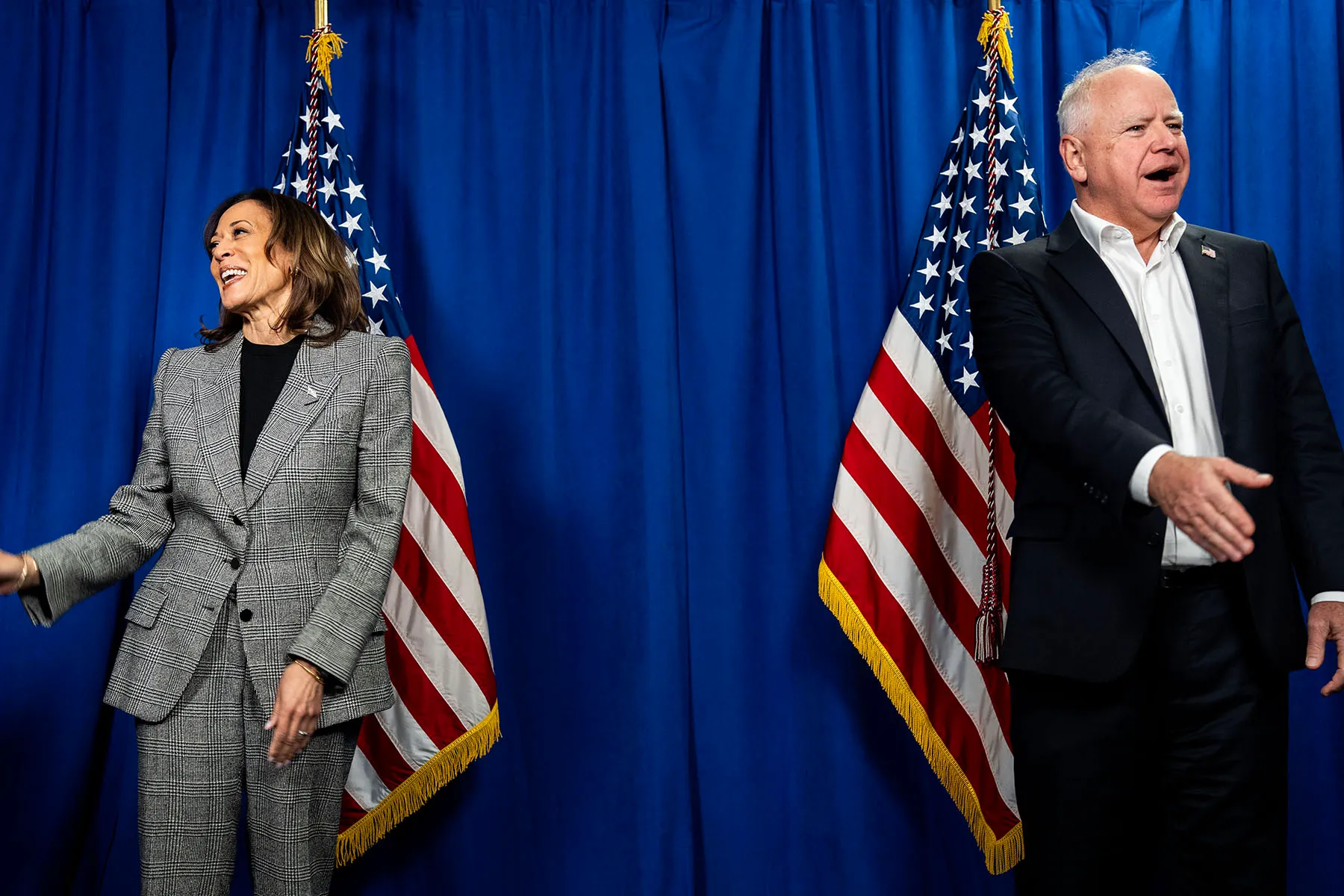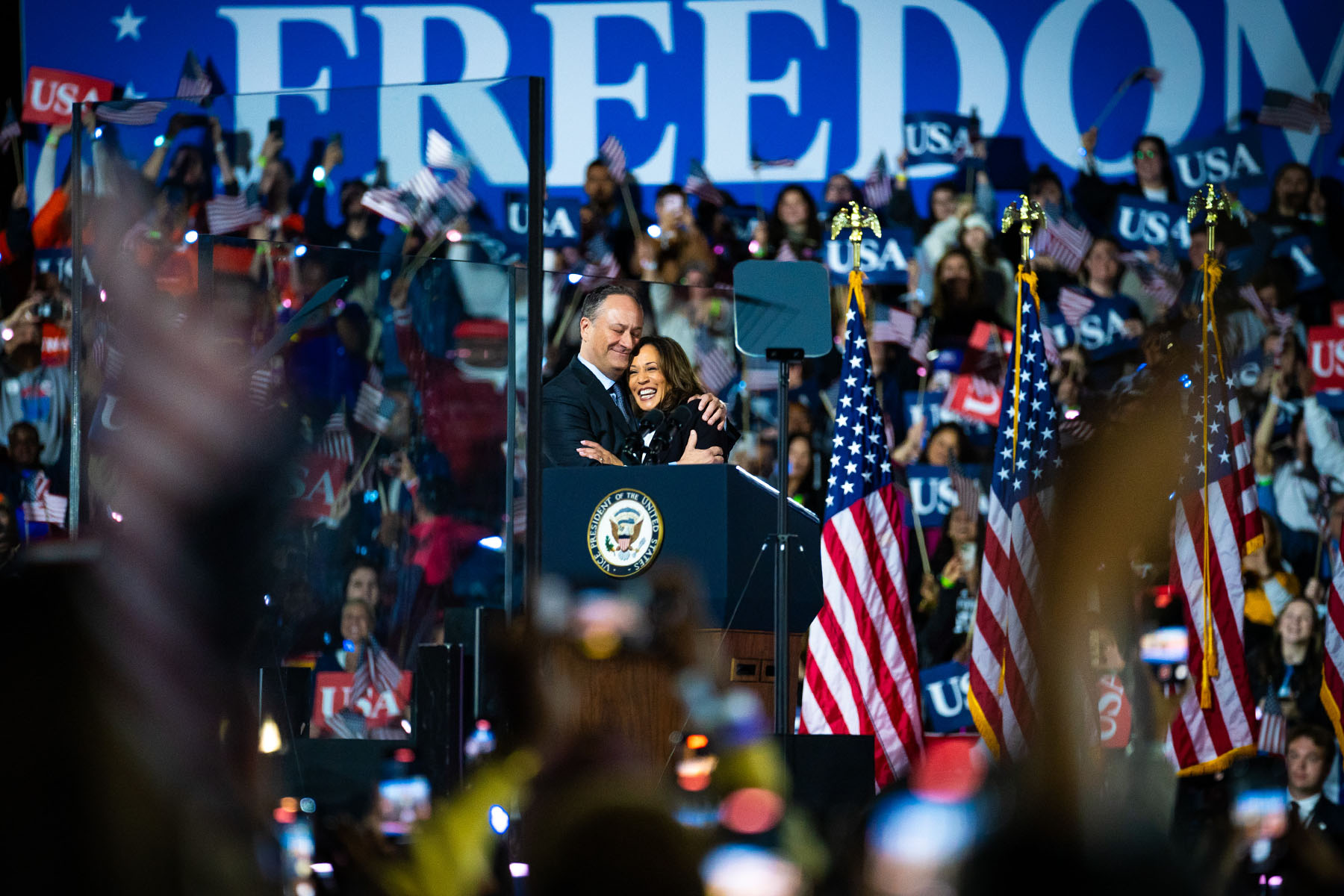On June 27 — the day of the first and only presidential debate between President Joe Biden and former President Donald Trump — only 37 percent of Americans said they had a favorable opinion of Vice President Kamala Harris. More than half — 54 percent — held an unfavorable opinion, according to 538.
By August 5, Harris had officially become the nominee and her favorability rate had jumped to 43 percent. As of October 26, it was at 46 percent, meaning Harris had done something virtually unprecedented: She had become more likable since becoming a major party’s nominee.
Generally, Americans think less favorably of people who are running for president. This has been true, too, of the only other woman to be a major party’s nominee; former Secretary of State Hillary Clinton’s unfavorability rating reached a record high in the final stretch of her campaign for the presidency. So it’s remarkable that any presidential candidate has seen their favorability continually improve since becoming a major party’s nominee. It is even more remarkable that that candidate is not only a woman, but a woman of color.
It remains to be seen whether Harris will be able to clinch a victory in what appears to be a dead-heat race between her and Trump, who is currently underwater with Americans: 43 percent view him favorably and 52 percent unfavorably. But the change in Americans’ perceptions of Harris sheds light on how they see vice presidents, women in positions of power and the country right now.
To understand the striking uptick in Harris’ favorability is to understand a truth in American politics — that the moment anyone becomes a candidate or nominee, scrutiny goes up and likability goes down. It’s a dynamic historically exacerbated by sexism. Harris’ trajectory bucks that trend.
The sexism is often fueled by a belief that has historically operated as a standard in American politics: Women can’t want it.
“For women, ambition is a four-letter word,” said Amanda Hunter, the former executive director for the Barbara Lee Family Foundation, which for over two decades conducted nonpartisan research into women in politics, especially when in executive office. “When women show ambition, they tend to face a backlash.”
But Harris’ bid has an asterisk: Because of the way she became the nominee, voters perceive her as having stepped up and solved a problem by assuming a duty after President Joe Biden dropped out, Hunter said — something that they’re comfortable with seeing women do.
“I think that’s partially why people are reacting so positively. She’s been able to turn all of this around so quickly and really rise to the occasion … but she’s also done it under the umbrella of serving her party and serving her country, and not under the optics of ambition,” Hunter said.
-
Read Next:
Kelly Dittmar, an associate professor of political science at Rutgers University and the director of research for its Center for Women and Politics, said it’s important to take into account who else has occupied the national stage in the past few months: Biden, post-debate; Trump, swaying to music for 39 straight minutes and praising Hitler’s generals; and Sen. JD Vance, Trump’s running mate, maligning childless cat ladies and immigrants.
“Part of what’s happening is a credit to Harris, but also something that might be a bit outside of her, in that another solid Democratic person may have also benefited from that moment of change,” Dittmar said of the initial bump.
Harris had a net positive favorability with Americans for a short period about a month ago; she’s now slightly underwater, but still viewed more favorably than her opponent. Trump is particularly unpopular among women. According to a Quinnipiac University poll from October 30, men back Trump 57 percent — versus 37 percent for Harris. Women, meanwhile, back Harris 55 percent and 39 percent support Trump, who has been convicted of 34 felonies and found liable in civil court for sexual assault, defamation and fraud. He has also been accused of sexual misconduct by dozens of women.
Hunter said Harris has had to overcome what’s often referred to as the “imagination barrier,” or the perception among many voters that a woman can’t do well in a job that a woman has not held before. When voters are asked to picture a governor, the majority picture a man. A vice president? Also a man — and Harris is the first one not to fit the mold. The president of the United States? Well, you get the point.
These beliefs mean that the barriers Harris needs to overcome are two-fold. Not only is she running for an office most people can only imagine a man holding because a man has only ever held it, but they also might find themselves questioning her credentials because she’s also the first woman to hold her current job.
“With other vice presidents, people didn’t really question it because the man looked, sounded and acted like every other vice president that came before him. They sort of all looked a part, for lack of a better description,” Hunter said. “And so people weren’t really asking, ‘What is Mike Pence really doing every day?’ They just assumed he was probably doing important things.”
Harris entered the race with decades of experience navigating the double standards faced by women in politics — and especially women of color in politics. A number of former Harris aides who spoke with The 19th for this story said that this dynamic has also made her preternaturally skilled at tuning out the noise, opting to focus on the work rather than others’ expectations.
They say she’s also benefited from taking on the top spot in the campaign, allowing her to reintroduce herself.
An October survey from KFF, a nonprofit health policy research, polling and news organization, found that a greater share of women voters now say that they trust Harris more than Trump when it comes to the economy, which they also name as their top concern in this election. This marks a notable shift from when this survey was conducted in June. Back then, Biden was still the Democratic nominee and women voters were evenly split on which party they believed could better help them manage rising costs.
The more recent survey also found that since Harris became the nominee, 64 percent of women voters say they are satisfied with their choice of presidential candidates for the 2024 race. Only 40 percent said the same in June, when Biden was still the Democratic nominee. In addition, seven in 10 women now say they feel motivated to vote in the presidential election, compared with 45 percent in June.
Marci, a 52-year old woman from rural east Texas, is a conservative-leaning independent who was unenthusiastically but definitely voting for Trump when Biden was the Democratic standard-bearer.
“I’m just utterly frustrated with the shape of the country right now, and I feel in large part that’s due to Biden,” she said.
But Harris becoming the nominee moved her to the undecided camp.
“Being a female and having younger female relatives who are going to grow up in this country, I feel like Kamala is a better choice there because I feel like she’s going to lead us in a better direction,” Marci said.
Marci didn’t know much about Harris before she became the nominee, but in the months since, Marci has been taking the time to learn more about her. She privately researches claims she hears, including from her husband, whom she describes as a “rabid Republican.”
Marci works 40 hours a week at a local Home Depot store. For her, the economy is the biggest issue, followed by immigration.
Marci is still concerned about some of Harris’ policies — and Trump’s stability — but she has concluded that Harris is “a very intelligent woman.”
“I know she’s struggled to get to where she is and she’s had to fight hard for that. So I have to be, being a woman, respect that,” Marci said. “I feel like she’s got some good ideas about how to change things in our country.”
Makayla, 25, now lives in New Mexico but grew up in California’s Central Valley and describes herself as someone coming from “a low socioeconomic situation.” She now works at a nonprofit and hopes to work in government herself one day. After she saw the Biden-Trump debate, she wrote to her elected officials asking them to sign on to letters asking for Biden to drop out of the race.
Marci and Makayla are both respondents to the KFF poll who spoke on condition that only their first names were used.
When Biden did and endorsed Harris, Makayla said she was excited but skeptical. She liked her pick of Minnesota Gov. Tim Walz as Harris’ running mate, seeing him as someone with a progressive track record. Her initial excitement has waned because, Makayla says, she has seen Harris trying to win over “moderate Republican, suburban wine moms and not their actual base.” But she is still voting for Harris, even if she wishes Harris had taken a more aggressive stance in outlining a roadmap for a ceasefire in Gaza and a more explicit progressive economic agenda, such as backing a single-payer health care system.

But, Makayla said, “I think she has done a really good job when she became the nominee of really explaining her story and sharing it with the American people — where she’s from and who she is.”
Makayla said that Harris doesn’t have “that kind of political charisma” she has typically associated with those running for president — but that Harris is who she says she is. “She’s a prosecutor — that’s who she is,” Makayla said. “She’s a pretty straightforward person, I think, because of that background.”
Current and former aides also point to Harris’ background as a prosecutor as the root of her pragmatism, saying it has made her focused on crafting deliverable results from the facts on the ground. It’s also made her good at delivering the message, they say.
Carmel Martin, Harris’ former domestic policy adviser who began working with her during her 2020 presidential campaign, said she thinks voters are “responding to the fact that she has a very positive and very future-looking orientation.”
Harris is “relentless” in making sure any policy proposal results in measurable, tangible results — and that her team comes up with clear, concise ways to communicate that to those who stand to be most impacted, Martin said.
Hunter said that message is also landing in a very different political climate — particularly for women voters — than it would have eight years ago.
The Women’s March following Trump’s inauguration, the virality of the #MeToo movement, the public reckoning spurred by the Black Lives Matter movement, the election of a record number of women governors and the caregiving crisis crystallized by the Covid-19 pandemic have collectively meant women are at the center of our politics.
“Voters right now, and over the last couple of years especially, have felt so cynical. In our focus groups, what we have heard is that they have felt like no one cares about them,” Hunter said. Harris seems to be addressing this narrative head-on, she added. “She’s been able to acknowledge the challenges that people are living through and then talk about how they’re going to fix them. And it’s resonating.”







